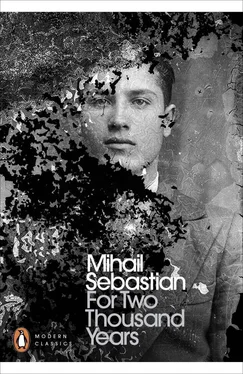‘I can practically hear that Jabotinski. “You don’t make a country out of practicalities.” Oh really? So what do you make it out of? Out of spirit? Perhaps with spirit, but before that comes the fact of geography, which you can’t charm away with lyrical words, the way you can charm a roomful of kindly Jews. Land makes its own terrible demands: so many square kilometres of land, this many mountains, this much rain, this much drought. How are you going to colonize a land the size of three counties with 15–17 million people?
‘And what will you do with the indigenous Arabs, who also have the right to a natural death, rather than an abrupt one by Zionist extermination? How will you bring to life an artificial conglomeration of people brought from every corner of the earth through a so-called national process, while ignoring the bloodiest problems of the proletariat, social class, falsified political economy? I’d like to know if this Mr Jabotinski has heard of Palestinian labour unrest, of a Palestinian proletariat, of Palestinian finance. And I’d like to know how he proposes to accommodate them.
‘In fact, I don’t need to know. Because I know without him telling me.
‘I can almost hear him saying it: “The problem of social struggle is subordinate to the national imperative.” Not even Mussolini talks that way. Not even German counter-revolutionaries. Not even Nicholas I, the Tsar of all Russians.
‘Jewish national unity is an absurdity. I don’t know any Jews: I know workers and the bourgeoisie. I don’t know of a Palestinian national problem. I know about a practical economic problem involving Syria, Palestine and Mesopotamia, which is not any more interesting than the problems of Cuba, Indochina and Eastern Rumelia. The rest is a myth, an idyll, a chimera.’
S.T.H. is an incurable Marxist. It’s gone beyond a system of political thought and is now a complete inability to understand life in any other terms. Anything that’s not expressible in figures is for him not real. For every fact there is a document, every proof a counterproof, and beyond that everything else — as he puts it with terrible finality — is an idyll …
I was afraid Winkler would be provoked and feel compelled to make counter-arguments. I don’t know if he’d have lost the battle — polemicists like ST.H. put up a stiff fight — but I know we would have spent a wasted evening. Winkler would have produced a set of figures, demonstrating the viability of a Jewish Palestinian state, and S.T.H. would have produced another set of figures to demonstrate the exact opposite.
Again I observe that Winkler, despite his obtuse exterior, can sense nuances when he has to and size up a situation. He replied to S.T.H. by shifting the plane of the argument.
‘I’m not going to argue with you about matters of Palestinian geography and economics, though I could do so. Nor will I attempt to show you that your arguments about the Arabs and the Jewish proletariat carry no weight. I don’t deny their reality, but there’s a hierarchy of realities which you refuse to recognize. So between two equally valid arguments, one may cancel the other, because it has another meaning, is of another order. So let’s leave it.
‘The question for me isn’t whether Jews can create a Palestinian state, but whether they can do anything but. Understand? The chances of the enterprise succeeding matter less than the fact that it is so pressing. If we don’t do this, we die. If we do — according to you — we still die. I don’t know. Maybe we will, maybe we won’t. And for this “maybe” it’s worth making the journey. Don’t ask a nation on the road to creating a country to count its money, take out an insurance policy and make a hotel reservation. In the end, to be honest with you, I find this whole argument pointless. I’m a soldier, a bricklayer, a miner. I listen and work. The rest is an idyll — if I may quote you.’
‘No you may not. You reason like a girl. Why do you love me? “I just do.” Why don’t you love me any more? “I just don’t.” Admit it, your argument isn’t any better. You explain yourself with “just because”. Why are you a Zionist? “Just because.”’
I wanted to interject here, though the lightning flashing in S.T.H.’s eyes made it risky.
‘I’ll ask Winkler to allow me to reply for him. I just want to tell you, dear S.T.H., that this “just because” you laugh at is still a decisive reply. To be a Zionist “just because” means to be a Zionist naturally, by destiny, it’s like being white, or blond, or dark, a Zionist because it’s raining or snowing, because the sun’s rising or setting … I think this is the point at which the Zionist drama begins. In any case, this is where my doubts begin. Because I don’t think Jews are ready to live such a collective life directly and naturally. I regret saying it — though it’s not the first time the idea has occurred to me. I have the feeling that the Zionist movement is an expression of despair: a revolt against destiny. A tragic effort to move towards simplicity, land, peace. Intellectuals who want to escape their solitude. And I believe, ultimately, that the Zionist project contains this tragic seed while we hurry on, hoping we might be able to forget about it … But won’t it rise to the surface some day? For me, this is the only question.’
‘No,’ Winkler replied, sure of himself.
S.T.H. was quiet for a while, and just looked from one of us to the other, with a certain compassion. Then he burst out with it.
‘Let’s go, we’re wasting the evening. It’s impossible to talk to you. Myths, superstition, poetry … Do you pair reason about anything? On what basis? You sing. A couple of tenors, that’s what you are. Puccini, Giacomo Puccini — our master. Waiter, the bill.’
*
I don’t think Winkler is trying to convert me to Zionism. But he has time for me, because I intrigue him a little. With his believer’s calm, my psychological doubts about Zionism throw him off much more than S.T.H.’s political objections.
He sought me out yesterday evening to invite me to a meeting.
‘Come on,’ he said. ‘You’ll meet a Palestinian. A pioneer, Berl Wolf.
‘Really, until now we’ve just been talking like in books, about ideas, impressions, arguments. But this is a living man, flesh and blood. You have to meet him. I told him about you and said I’d bring you.’
Indeed, I went and, I don’t know why, on the way I was very unsettled … I had cold feet. I had asked Winkler for a few details about this Berl Wolf, whom I was going to meet and find out about. A fabulous tale, in short. At age fourteen, he flees on his own from Russia in the early days of the Revolution, a docker in a southern port several months later, stuck in Kiel in 1918 when the sailors mutiny, studies for a year at an English college, crosses the Atlantic, spends some time in the United States, where he’s a successful scandal journalist, and one day drops everything and leaves for Palestine, as a labourer in a colony. He’s there for a year, working from dawn till dusk with pick and spade … One morning, at the hour when they set off for the fields, there’s an Arab attack. He takes a bullet in the right arm, near the shoulder, breaking the bone. Crippled, there is nothing he can do on the plantation. He goes to the office of the Zionist executive and says: ‘I want to continue working, use me somehow, give me a task.’ So they sent him to Europe as a propagandist.
Climbing the stairs, I was sorry I’d come. If Winkler hadn’t been with me, I might have turned back on reaching the doorstep. ‘Who knows what’s waiting for me.’ A long conversation with an agitated prophet, another series of arguments, another string of misunderstandings, another S.T.H., a Zionist this time and much more intolerant than the first one, because this one would speak, without wanting to, in the name of his sacrifice, with the silent prestige of an arm lost in battle. I felt already humiliated by any victory possible over him through argument.
Читать дальше












